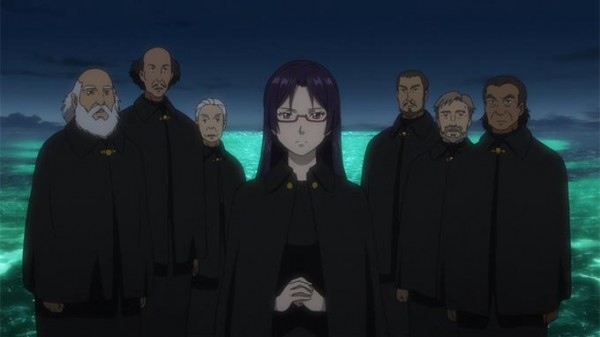Gargantia on the Verdurous Planet Episode 8 – The Musical Component: The Strings in Fairlock’s Passing

Background: Episode 8 marks the death of Captain Fairlock, the skipper who succeeded in obtaining the loyalty of other sea captains to continue under his banner and journey with the Gargantia. In the aftermath of his death, Gargantia’s captaincy passes on to his foster daughter Ridget, who must contend with those who wish to secede from the Gargantia in pursuit of their own goals.
Analysis: Given its timbre, the violin, with its capacity to draw out a sense of melancholia, has been used to convey sadness borne out of a broken heart or a loved one’s death. It’s this latter aspect that’s worth touching upon for the purposes of looking at episode 8 of Gargantia on the Verdurous Planet, where we have quite a few violin pieces that mark a beloved captain’s passing. The use of violin music to convey the sentiments found in this moment isn’t without precedent; one of the most famous examples is Samuel Barber’s Adagio for Strings, which was played on TV when announcing the death of President John F. Kennedy and performed at the funeral of Albert Einstein. After all, death’s the final word, bringing a plethora of emotions that include pain, sorrow, and uncertainty. Pieces like Barber’s Adagio allow our emotions to manifest in musical form, a medium that can convey thoughts and feelings where words simply would not do.
A Captain’s Passing
[audio:Gargantia 801.mp3]
So as the episode marks the moment of Captain Fairlock’s death, a solemn orchestral piece propelled by the strings soberingly steps in. In its wake, one isn’t left feeling mournful simply because the anime has not given us any reason to be attached to Fairlock or even Ridget. Rather, the emotion that comes in is one of trepidation. We realize, from getting a feel for the ins and outs, nooks and crannies of the Gargantia, that running such a ship is a monumental task and the music’s grimness gives a premonition for the rough road ahead, as other people, with their own ideas, begin to literally diverge from Gargantia’s course.
Partings
[audio:Gargantia 802.mp3]
The strings, then, serve as a means to also convey the enormity of the event unto the audience and getting them to empathize with the difficulties the new leader faces. Although the characters’ sadness is a component of what the music seeks to express, it would be a mistake to say that the entirety of its focus is on what the characters are feeling. The scene in which we see a representation of the other ships disconnecting and drifting off from Gargantia through the board in the Captain’s room is an excellent example. Here, the strings continue their expression of somberness, signaling that not only is Ridget going through much stress as she tries to figure out the best course of action, what we’re witnessing is an end of a unified Gargantia, and therefore, an era.
The End of an Era
[audio:Gargantia 804.mp3]
Where things go from here is anyone’s guess, but as Captain Fairlock’s corpse enters the sea, the chorus reinforces his passing. With that, Fairlock’s leadership comes to an end as he literally exits the picture; it’s now Ridget’s turn to don his mantle. As the strings become more dominant, the tension grows from the uncertainty hanging over the air as the melody illustrates that the Gargantia’s direction and success will rely upon Ridget’s ability to win over those who’ve opted to stay behind. A tough task given that she does not know how willing they are and struggles out of desperation to make her case without knowing the outcome.
But she wins their support. The final piece of music features little of the melancholia and uncertainty as the strings play out a consonant melody that nudges audiences to look onward. For good or for ill, the Gargantia’s course has now been charted and perhaps a bright future is in store for them all… in spite of Gen Urobuchi’s reputation.
To be sure, Taro Iwashiro’s compositions for this episode of Gargantia aren’t on the level of Barber, but they are solid all around in depicting the fallout from Captain Fairlock’s death and the struggle that befalls the new leadership. Throughout the episode, the music shows a sense of progression; because of that, I’m perplexed as to why some people found the musical implementation here to be poor. Which is to say it’s easy to overlook the purpose of music to deliver unto the audience the significance of an event, and if anything, that’s one component that’s missing in this writer’s analysis of Gargantia’s music use.

Pingback:A Double Dose of Suisei no Gargantia
Pingback:Organization Anti-Social Geniuses » Reference Resource Mondays: Attack on Links